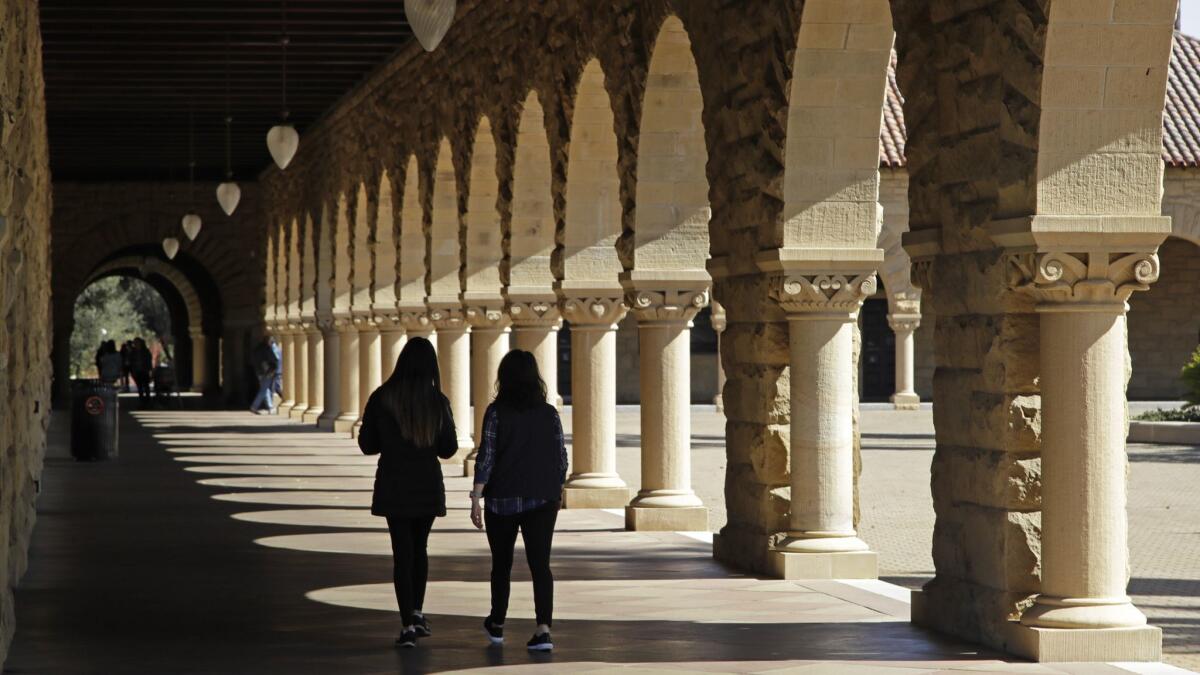College admissions scandal shows our obsessions with elite schools and rankings

- Share via
Reporting from San Diego — The college admissions cheating scandal that exploded last week — in which wealthy parents are accused of paying bribes to get their children into elite universities — speaks to a larger obsession about admission into big-name schools.
The fraudulent operation was run by William “Rick” Singer of Newport Beach, who founded a college counseling and prep business that arranged for parents to essentially buy their kids access to elite schools. He also ran a nonprofit charity that allegedly processed bribes paid by parents. Singer and his associates, prosecutors say, arranged for some students to cheat on entrance exams. Parents paid Singer, in one way or another, about $25 million.
How much does it matter?
The obsession extends to lower- and middle-class parents who mistakenly believe that their children will be doomed if they don’t get into top-ranked schools, even though the rankings produced by companies such as U.S. News & World Report generally are seen as flawed.
“I remind parents that CEOs of Fortune 500 companies mostly come from state universities, not the so-called best private campuses,” said David Marcus, a Pulitzer Prize-winning education writer.
His words were echoed by Villanova University sociologist Rick Eckstein, who told the San Diego Union-Tribune: “Georgetown and USC may be better than other schools — or not. There are a million ways to measure this, and all are more problematic than the last. This all has to do with perception.”
The rankings game
The focus on elite colleges comes as more and more companies publish lists that purport to rank the best universities.
The market leader is U.S. News & World Report, which released its latest rankings of graduate programs last week. UC San Diego and other universities were promoting those rankings Tuesday when the Justice Department announced charges in Operation Varsity Blues.
“Most raters in the U.S. News exercise are operating on 20- to 30-year-old assumptions and experiences they had and are therefore biased and outdated,” Dr. Ralph Kuncl, the president of the University of Redlands, told the Union-Tribune last fall.
“Thus, the subjective reputation measure is a sham collection of half-remembered experiences.”
College rankings also have been criticized by the Brookings Institution, a Washington think tank that reported in 2015, “Popular rankings of college quality, such as those produced by U.S. News, Forbes and Money, focus on a small fraction of the nation’s four-year colleges and tend to reward highly selective institutions over those that contribute the most to student success.”
What is elite?
The University of San Diego has promoted itself as a top school, and it was described as such on Tuesday when the Operation Varsity Blues charges hit the news. But the school accepts about half of all applicants, and it ranks a modest 85th on U.S. News’ list of the best national universities.
“Many of the most well-known colleges are the ones with the fewest financial issues,” said Shirag Shemmassian, an academic counselor in San Diego. “That said, there is a financial incentive to be seen as elite. Specifically, U.S. News rankings are positively correlated with tuition: the higher the ranking, the larger the tuition bill.”
Orly Lobel, law professor at the University of San Diego, said it’s a good thing that universities compete to land the best students.
“But if the competition becomes skewed and focused on how to draw those who are wealthy and privileged,” she said, “then we need to stop and remember the reason universities exist: the pursuit of knowledge and truth, education, research and learning.”
Robbins writes for the San Diego Union-Tribune.
More to Read
Sign up for Essential California
The most important California stories and recommendations in your inbox every morning.
You may occasionally receive promotional content from the Los Angeles Times.













